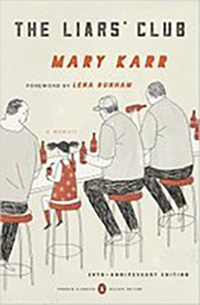
Book Club
Mary Karr
Tuesday, March 7, 2017
Synopsis
Winner, PEN/Martha Albrand Award
When it was published in 1995, Mary Karr’s The Liars’ Club took the world by storm and raised the art of the memoir to an entirely new level, as well as bringing about a dramatic revival of the form.
Karr’s comic childhood in an east Texas oil town brings us characters as darkly hilarious as any of J. D. Salinger’s—a hard-drinking daddy, a sister who can talk down the sheriff at twelve, and an oft-married mother whose accumulated secrets threaten to destroy them all.
Now with a new introduction that discusses her memoir’s impact on her family, this unsentimental and profoundly moving account of an apocalyptic childhood is as “funny, lively, and un-put-downable” (USA Today) today as it ever was. (From the publisher.)
Reading Group Discussion Questions
- A major theme running through The Liars’ Club is the difference between Mary Karr’s parents. “With Mother,” Karr writes, “I always felt on the edge of something new, something never before seen or read about or bought, something that would change us…. With Daddy and his friends, I always knew what would happen and that left me feeling a sort of dreamy safety.” Karr’s mother is artistic and glamorous, while her father is down-to-earth. How do these contrasts lay the foundation for the Karr’s family life? Did you empathize with one parent more than the other? Did your feelings change as the book went on and more was revealed about them?
- Despite the horror that permeated Karr’s childhood, characteristics like humor, honesty, and courage pervade The Liars’ Club. Karr does not pass judgment on her family or tell us how she thought they should have behaved. Would you have liked to have known more about Karr’s feelings about the events that she recounts? In what instances? Or were you able to discern how she felt through her actions? What emotions did you experience while reading The Liars’ Club?
- Karr is a character in her own book, as well as its author. On the page, she’s a tough, scrappy kid who also has a tremendous sensitivity and devotion to the people around her. As readers, we understand the interior joys and terrors that make her such a rich and vivid character. How do you think she seemed to the people around her? If her mother was to make a list of her strongest characteristics, what would they be? If her father made such a list, would it differ in any way?
- Karr tells her story for the most part from the point of view of a child, and what a child sees and understands. How might the story – and Karr’s perceptions – change if she had told it from the point of view of an adult, with the benefit of everything she has come to understand about her upbringing and her family? What would be gained, and what would be lost?
- The author’s mother, Charlie Marie, never fully realized her dreams of becoming an artist. The author, who as child began to write poetry, was able to realize her creative ambitions. What gave Karr the strength to pursue that ambition? Was it “sheer cussedness,” one of the traits that characterized her as a child? Do you think the sadness of her mother’s unfulfilled dreams somehow propelled her? Do you think it had anything to do with her relationship with her father?
- How would you characterize Karr’s relationship with her sister, Lecia? Does it change as the book progresses?
- After Karr’s grandmother dies she sings, “Ding dong the witch is dead.” Were you surprised that she was happy her grandmother passed away? What in the grandmother’s character was so oppressive? Do you think her grandmother contributed to her mother’s despair and alcoholism? How important a part did she play in Karr’s life?
- In a recent interview Karr said that she had previously tried to write a novel based on her childhood experiences: “When I tried to write about my life in a novel, I discovered that I behaved better in fiction than I did in real life. The truth is that I found it easier to lie in a novel, and what I wanted most of all was to tell the truth.” What do you think of this statement? Karr’s father was famous for the tales he told during meetings of the Liars’ Club. At any point did you feel that the author was perhaps altering or stretching the truth?
- In the introduction to this guide, Karr states that while on tour to promote The Liars’ Club people from all walks of life told her they identified with her story. Do you identify with the Karr family? Did this influence you while you were reading the book? Is it “the essential American story,” as one reviewer stated?
(Questions issued by publisher.)
Additional Book Club Resources
Memoirs & Non-Fiction
• The Liars’ Club (1995)
• Cherry: A Memoir (2001)
• Lit: A Memoir (2009)
• The Art of Memoir (2015)
Poetry
• Abacus (1987)
• The Devil’s Tour (1993)
• Viper Rum (2001)
• Sinners Welcome (2006)
If You Liked The Liars’ Club, may we recommend …
An American Childhood, Annie Dillard
Don’t Let’s Go to the Dogs Tonight, Alexandra Fuller
Drinking: A Love Story, Caroline Knapp
The Boys of My Youth, Jo Ann Beard
All Over But the Shoutin’, Rick Bragg
This Boy’s Life, Tobias Wolff
Blackbird: A Childhood Lost and Found, Jennifer Lauck
A Wolf at the Table: A Memoir Of My Father, Augusten Burroughs
The Tender Bar, J.R. Moehringer
A Piece of Cake, Cupcake Brown

